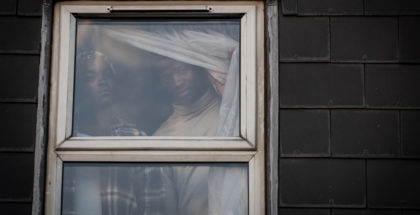Russian Doll: More than just Groundhog Day with hipsters
Review Overview
Episodes 1-3
7Episodes 4-8
9Natasha Lyonne
10Sophie Davies | On 07, Feb 2019
Dark, trippy and existential, Russian Doll proves to be a lot more than just Groundhog Day with hipsters.
We meet our protagonist, Nadia (Natasha Lyonne), on the night of her 36th birthday. Her hipster friends have thrown her a party and she’s in the bathroom looking into the mirror, or as she puts it, “staring down the barrel of my own mortality”. The party is in full swing, but Nadia chooses to leave early with a man she’s only just met. After the hook-up at her apartment, she promptly orders him an Uber and goes out to look for her cat, who has been uncharacteristically missing for three days. While darting across the road in pursuit of the cat, Nadia is hit by a car and dies… only to find herself instantly back at her party, in front of the bathroom mirror, at the exact point in time we first saw her.
Nadia has a penchant for cigarettes, drink and drugs, and her friend Maxine (Greta Lee) refers to her as a cockroach – “You can eat anything, take anything, do anything. It’s impossible to destroy you, you’ll never die!” But death suddenly appears to be inevitable for her, as she continues to live the same night over and over again until she dies, in a variety of ways, and time resets. Sometimes, she meets her death on the night of the party (the stairs prove to be a particular problem for her) and sometimes she gets to live some of the next day, but she never makes it past 24 hours. Much like in Groundhog Day, the show’s most obvious point of comparison, Nadia’s memories are intact after each reset, but nobody around her is aware that anything unusual is going on.
Over the first three episodes, which are enjoyable enough but outdone by what comes later, we follow Nadia as she desperately tries to figure out what’s happening to her and why. She first suspects that a cocaine-laced joint, given to her at the party by Maxine, could be the root of the problem. She then becomes convinced that the apartment building, which used to be a Jewish school, is haunted and that she must have fallen victim to some sort of curse. After all, the alternative is mental health, which was the undoing of her mother, and Nadia is determined to reject that as an option. As a video game programmer, we see her fix a software bug in a matter of seconds, but when it comes to this bug in her own system, things aren’t quite so simple.
Without giving too much away (and Russian Doll is honestly best enjoyed without knowing too much in advance), a moment in Episode 3 takes the narrative in a new direction, and from Episode 4 onwards, Nadia is no longer looking for answers alone. In the latter half of the series, Nadia’s life become increasingly intertwined with someone else’s, while she is forced to confront her own inner demons, and the show becomes all the more compelling as a result.
Playing a cynical, smart-talking, self-destructive New Yorker, Natasha Lyonne is in her element. She also co-created the series, with Amy Poehler and Leslye Headland, and has mentioned in interviews that it feels almost semi-autobiographical for her, since she has struggled with addiction and feels like she has narrowly escaped death several times. The supporting cast are equally impressive, including Charlie Barnett, Elizabeth Ashley, Lyonne’s Orange is the New Black co-star Dascha Polanco – and, in a small but significant role, her real-life close friend Chloë Sevigny.
It may be high-concept but Russian Doll is refreshingly succinct, taking just eight episodes (around 25-30 minutes each) to tell its story, making it very easy to binge. It also manages to wrap things up in a satisfying way, with a powerful message about the importance of seeking help, learning to accept help from loved ones and offering help to others. With plenty of layers to unpack, just like its namesake, it’s a show that benefits from repeat viewings and is likely to stay with you long after you’ve finished watching.
Russian Doll is available on Netflix UK, as part of an £9.99 monthly subscription.





















